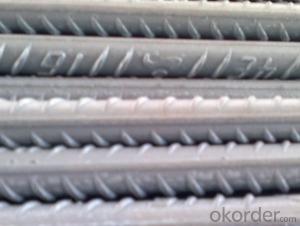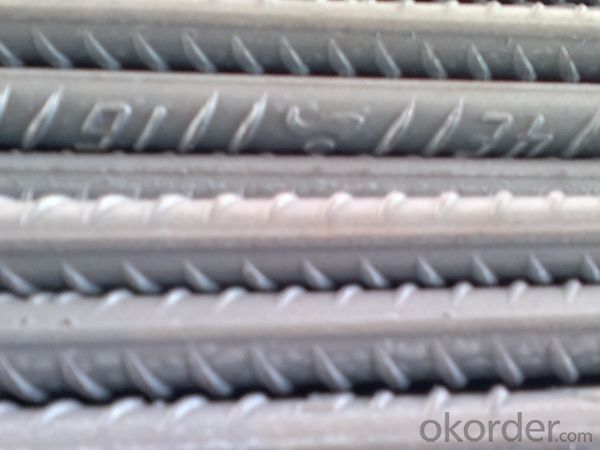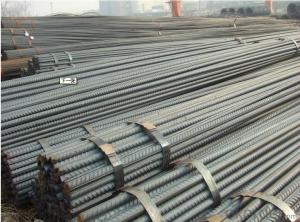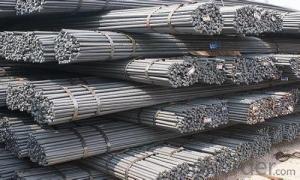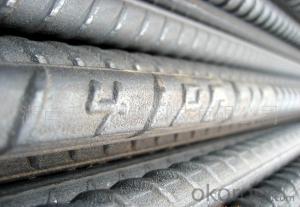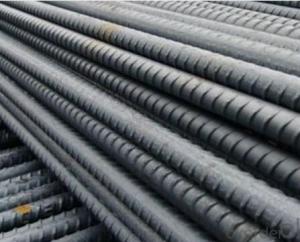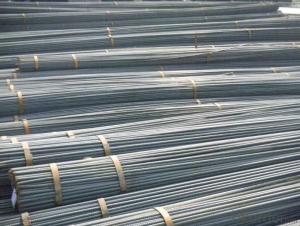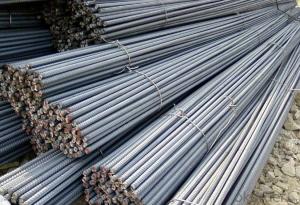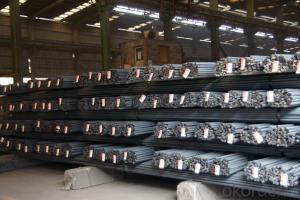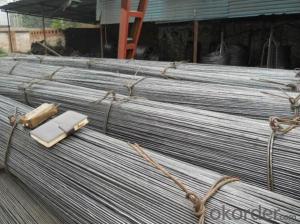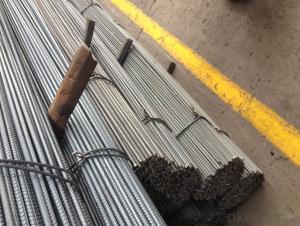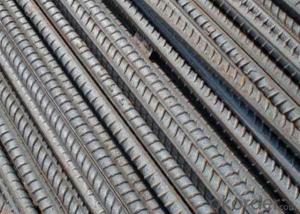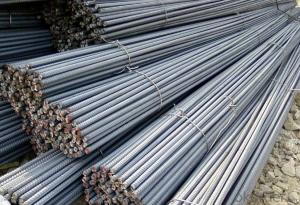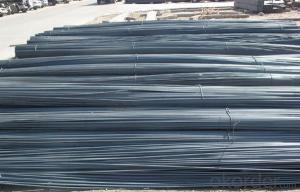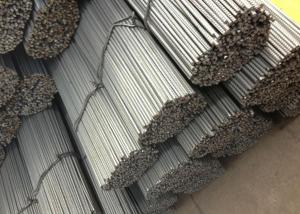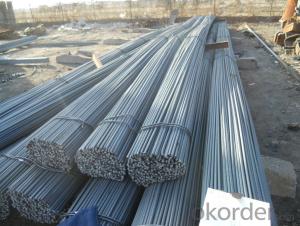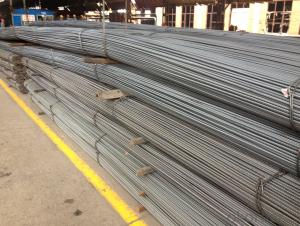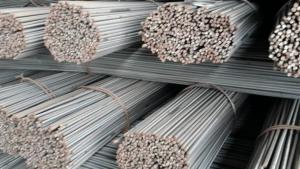Hot Rolled Deformed Steel Rebars for Construction HRB400,500
- Loading Port:
- Tianjin
- Payment Terms:
- TT or LC
- Min Order Qty:
- 25 m.t.
- Supply Capability:
- 200000 m.t./month
OKorder Service Pledge
OKorder Financial Service
You Might Also Like
Product Description:
OKorder is offering Hot Rolled Deformed Steel Rebars for Construction HRB400,500 at great prices with worldwide shipping. Our supplier is a world-class manufacturer of steel, with our products utilized the world over. OKorder annually supplies products to European, North American and Asian markets. We provide quotations within 24 hours of receiving an inquiry and guarantee competitive prices.
Product Applications:
Hot Rolled Deformed Steel Rebars for Construction HRB400,500 are ideal for structural applications and are widely used in the construction of buildings and bridges, and the manufacturing, petrochemical, and transportation industries. Deformed bar is widely used in buildings, bridges, roads and other engineering construction. Big to highways, railways, bridges, culverts, tunnels, public facilities such as flood control, dam, small to housing construction, beam, column, wall and the foundation of the plate, deformed bar is an integral structure material.
Product Advantages:
OKorder's Steel I-Beams are durable, strong, and resist corrosion.
Main Product Features:
· Premium quality
· Prompt delivery & seaworthy packing (30 days after receiving deposit)
· Corrosion resistance
· Can be recycled and reused
· Mill test certification
· Professional Service
· Competitive pricing
Specifications of Hot Rolled Deformed Steel Rebars for Construction HRB400,500
Standard | GB UK USA | HRB335 HRB400 HRB500 G460B, B500A, B500B,B500C GR40, GR60 | |
Diameter | 6mm,8mm,10mm,12mm,14mm,16mm,18mm,20mm, 22mm,25mm,28mm,32mm,36mm,40mm,50mm | ||
Length | 6M, 9M,12M or as required | ||
Payment term | TT or L/C | ||
Trade terms | FOB, CFR, CIF | ||
Application | Building, construction | ||
Each bundle weight | 2-3MT, or as required | ||
Type | Hot rolled steel rebar | ||
Brand name | OKORDER | ||
Theoretical weight and section area of each diameter as below for your information:
Diameter(mm) | Section area (mm²) | Mass(kg/m) | Weight of 12m (kg) | Pcs/ton |
6 | 28.27 | 0.222 | 2.664 | 375.38 |
8 | 50.27 | 0.395 | 4.74 | 210.97 |
10 | 78.54 | 0.617 | 7.404 | 135.06 |
12 | 113.1 | 0.888 | 10.656 | 93.84 |
14 | 153.9 | 1.21 | 14.52 | 68.87 |
16 | 201.1 | 1.58 | 18.96 | 52.74 |
18 | 254.5 | 2.00 | 24 | 41.67 |
20 | 314.2 | 2.47 | 29.64 | 33.74 |
22 | 380.1 | 2.98 | 35.76 | 27.96 |
25 | 490.9 | 3.85 | 46.2 | 21.65 |
28 | 615.8 | 4.83 | 57.96 | 17.25 |
32 | 804.2 | 6.31 | 75.72 | 13.21 |
36 | 1018 | 7.99 | 98.88 | 10.43 |
40 | 1257 | 9.87 | 118.44 | 8.44 |
50 | 1964 | 15.42 | 185.04 | 5.40 |
Deformed Steel Rebar in warehouse
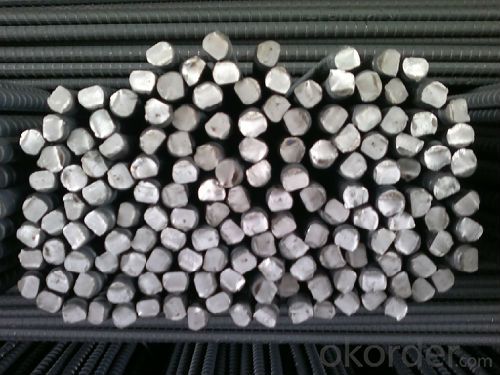
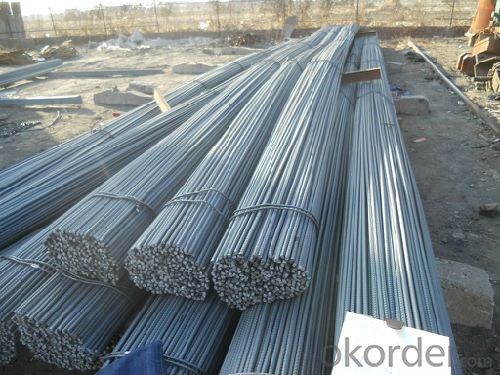
Packaging & Delivery of Hot Rolled Deformed Steel Rebars for Construction HRB400,500
Packaging Detail: products are packed in bundle and then shipped by container or bulk vessel, deformed bar is usually naked strapping delivery, when storing, please pay attention to moisture proof. The performance of rust will produce adverse effect.
Delivery Detail: within 45 days after received advanced payment or LC.
Label: to be specified by customer, generally, each bundle has 1-2 labels
Note:
1. Our products are produced according to national standard (GB), if not, supply according to national standards (GB) or agreement as customer required.
2. Other Grade and Standard Deformed Steel Bar we can supply:
Grade: GR40/GR60, G460B/B500A/B500B/B500C,BST500S
Standard: ASTM, BS, DIN
The Minimum Order Quantity of these products is high, and need to be confirmed.
3. We can not only supply Deformed Steel Bar; if you need anything about building materials, please contact us for further information.
4. Please send us your detail specifications when inquire. We will reply to you as soon as possible. We sincerely hope we can establish a long stable business relationship.
FAQ:
Q1: What is the normal tolerance of Hot Rolled Deformed Steel Rebars for Construction HRB400,500?
A2: Normally 3%-5%, but we can also produce the goods according to the customers' requests.
Q2: How do we guarantee the quality of Hot Rolled Deformed Steel Rebars for Construction HRB400,500?
A2: We have established an advanced quality management system which conducts strict quality tests at every step, from raw materials to the final product. At the same time, we provide extensive follow-up service assurances as required.
Q3: How soon can we receive the product after purchase?
A3: Within three days of placing an order, we will begin production. The specific shipping date is dependent upon international and government factors, but is typically 7 to 10 workdays.
- Q: Are steel rebars suitable for reinforcement in historical buildings?
- Yes, steel rebars are suitable for reinforcement in historical buildings. They provide strength and durability to the structure, enhancing its stability and longevity. Additionally, steel rebars can be designed and installed while minimizing visual impact, preserving the historical aesthetics of the building.
- Q: How do steel rebars affect the overall sound insulation of a building?
- The overall sound insulation of a building is not directly affected by steel rebars. Steel rebars serve to reinforce concrete structures and offer strength and stability in construction. Sound insulation is primarily determined by the materials and design of walls, floors, and ceilings, as well as the correct installation of acoustic barriers and insulation materials. Although steel rebars can transmit sound to a certain degree due to their density, their impact on sound insulation is usually insignificant when compared to other factors. To achieve sound insulation in buildings, it is necessary to utilize materials with excellent sound absorption properties, such as acoustic insulation panels, mineral wool, or soundproofing barriers.
- Q: What are the standard sizes for steel rebars?
- The standard sizes for steel rebars vary depending on the country and industry standards. However, some common standard sizes for steel rebars include #3, #4, #5, #6, #7, #8, #9, #10, #11, #14, and #18. These numbers indicate the diameter of the rebar in inches. For example, a #3 rebar has a diameter of 3/8 inch, while a #18 rebar has a diameter of 2 1/4 inches. It is important to note that different countries may have their own unique sizing systems, so it is always necessary to consult the local building codes and standards for accurate information on steel rebar sizes.
- Q: What is the role of steel rebars in minimizing creep deformation in concrete?
- Steel rebars play a crucial role in minimizing creep deformation in concrete structures. Creep deformation refers to the gradual and permanent deformation that occurs in concrete over time under sustained loads. This phenomenon can lead to structural instability and compromise the overall integrity of the concrete. Steel rebars, also known as reinforcement bars, are embedded within the concrete matrix to provide additional strength and stiffness. These rebars help counteract the tensile forces exerted on the concrete, as concrete is weak in tension but strong in compression. By resisting the tensile stresses, the rebars prevent the concrete from cracking and experiencing excessive creep deformation. The presence of steel rebars in concrete also improves the load-carrying capacity of the structure, allowing it to bear heavier loads without excessive deformation. This is achieved by distributing the applied load more evenly throughout the concrete, reducing localized stress concentrations and minimizing the potential for creep deformation. Furthermore, steel rebars act as a restraining element, limiting the movement of the concrete and reducing the potential for creep. The high modulus of elasticity and low thermal expansion coefficient of steel make it an ideal material for reinforcing concrete and restraining its creep behavior. In summary, the role of steel rebars in minimizing creep deformation in concrete is multi-fold. They provide additional strength and stiffness to counteract tensile forces, improve load-carrying capacity, and act as a restraining element, all of which contribute to maintaining the structural integrity of the concrete over time.
- Q: What are the common defects found in steel rebars?
- There are several common defects that can be found in steel rebars. One common defect is surface cracks, which can occur during the manufacturing process or due to improper handling and storage. These cracks can compromise the strength and integrity of the rebars and may lead to failure under load. Another common defect is corrosion, which can occur when the rebars are exposed to moisture or chemicals. Corrosion can weaken the rebars and reduce their load-bearing capacity, making them more susceptible to failure. Bending and straightening defects are also frequently observed in steel rebars. Improper bending or straightening can lead to cracks, buckling, or uneven stress distribution, compromising the rebars' performance. Inadequate welding or improper lapping of rebars can result in poor connections and reduced structural integrity. Welding defects such as lack of fusion, incomplete penetration, or excessive porosity can weaken the rebars and increase the risk of failure. Dimensional defects, such as variations in diameter, length, or straightness, can affect the rebars' fit and compatibility with other structural components. If rebars are not properly aligned or do not meet the required dimensions, it can lead to reduced structural strength and compromised performance. Lastly, improper heat treatment during the manufacturing process can result in internal defects such as segregation, inclusions, or improper grain structure. These defects can weaken the rebars and make them more prone to fracture or failure under load. Overall, it is essential to carefully inspect steel rebars for these common defects to ensure the structural integrity and safety of the construction projects they are used in.
- Q: Are steel rebars resistant to earthquakes?
- Yes, steel rebars are highly resistant to earthquakes. The use of steel reinforcement in concrete structures helps to improve their structural integrity and ability to withstand seismic forces. Steel rebars enhance the strength and flexibility of the concrete, making it more capable of absorbing and dissipating the energy generated during an earthquake.
- Q: What are the main properties of steel rebars?
- Steel rebars, also known as reinforcing bars, are essential components in reinforced concrete structures. They possess several key properties that make them ideal for providing strength and durability to these structures. 1. Strength: One of the primary properties of steel rebars is their high tensile strength. They can withstand significant pulling forces and provide the necessary reinforcement to resist cracking and structural failure in concrete. 2. Ductility: Steel rebars exhibit excellent ductility, meaning they can deform without fracturing under stress. This property allows them to absorb energy during seismic events or other extreme loads, enhancing the overall structural performance and resilience of the reinforced concrete. 3. Corrosion resistance: Steel rebars are typically manufactured with a protective layer, such as epoxy or galvanized coating, to prevent corrosion. This property is crucial as exposure to moisture, chloride ions, and other corrosive elements can significantly weaken the rebars and compromise the integrity of the structure. 4. Weldability: Steel rebars can be easily welded together, allowing for efficient and effective construction. This property ensures that rebars can be connected to form a continuous and robust reinforcement network, enhancing the overall strength and stability of the concrete structure. 5. Thermal compatibility: Steel rebars have similar thermal expansion and contraction properties to concrete, minimizing the risk of cracking or structural damage due to temperature changes. This compatibility ensures the long-term durability and stability of reinforced concrete structures. 6. Availability and cost-effectiveness: Steel rebars are widely available and relatively cost-effective compared to other reinforcing materials. This affordability, combined with their excellent mechanical properties, makes them a popular choice for structural reinforcement across various construction projects. In conclusion, the main properties of steel rebars include high tensile strength, ductility, corrosion resistance, weldability, thermal compatibility, and cost-effectiveness. These properties make steel rebars indispensable for providing structural strength and durability to reinforced concrete structures.
- Q: What is the lifespan of steel rebars in concrete structures?
- The lifespan of steel rebars in concrete structures can vary due to a range of factors. Generally, steel rebars are designed to provide concrete structures with durability and strength. Through proper design, construction, and maintenance, steel rebars can endure for many decades or even up to a century within concrete structures. One crucial factor that affects the lifespan of steel rebars is the quality of materials utilized. Rebars of high quality, which have corrosion-resistant coatings or are made of stainless steel, tend to last longer compared to regular carbon steel rebars. Moreover, the quality of the concrete used and its ability to shield the rebars from moisture and corrosive agents is also significant. Environmental conditions play a significant role in determining the lifespan of steel rebars. Exposure to harsh climates, such as regions with high humidity, saltwater, or acidic environments, can expedite corrosion and reduce the lifespan of the rebars. Adequate protective measures, such as maintaining the proper thickness of concrete cover, implementing waterproofing techniques, and utilizing corrosion inhibitors, can help extend the lifespan of steel rebars in such conditions. Maintenance and inspection are essential to ensure the longevity of steel rebars in concrete structures. Regular inspections should be conducted to detect signs of corrosion, cracking, or damage, and any necessary repairs or protective measures should be promptly undertaken. In certain cases, periodic coating or replacement of rebars may be necessary to uphold the structural integrity of the concrete elements. In conclusion, the lifespan of steel rebars in concrete structures can range from several decades to over a century, depending on various factors including material quality, environmental conditions, and proper maintenance. By implementing appropriate design, construction, and maintenance practices, the lifespan of steel rebars can be significantly prolonged, guaranteeing the long-term integrity and durability of the concrete structure.
- Q: How do steel rebars affect the acoustic properties of a structure?
- Steel rebars have a minimal impact on the acoustic properties of a structure. Due to their high density and stiffness, rebars can slightly improve the sound insulation capabilities of a building by reducing sound transmission through walls and floors. However, their influence on other acoustic aspects, such as reverberation or sound absorption, is negligible.
- Q: How are steel rebars used in the construction of wastewater treatment plants?
- Steel rebars are used in the construction of wastewater treatment plants to reinforce the concrete structures, such as tanks and basins, that are essential for storing and treating wastewater. The rebars provide strength and stability to these structures, ensuring they can withstand the weight of the water and the various chemicals used in the treatment process. Additionally, the rebars help to prevent cracking and structural failure, ensuring the longevity and reliability of the wastewater treatment plant.
Send your message to us
Hot Rolled Deformed Steel Rebars for Construction HRB400,500
- Loading Port:
- Tianjin
- Payment Terms:
- TT or LC
- Min Order Qty:
- 25 m.t.
- Supply Capability:
- 200000 m.t./month
OKorder Service Pledge
OKorder Financial Service
Similar products
Hot products
Hot Searches
Related keywords
